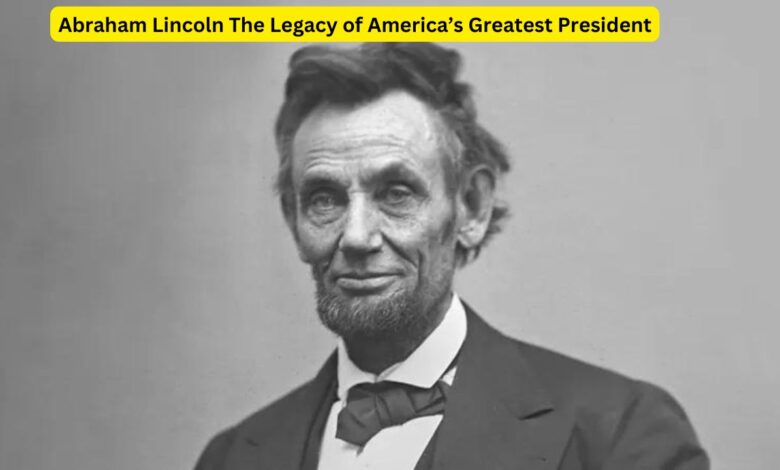Abraham Lincoln The Legacy of America’s Greatest President

Abraham Lincoln is an iconic figure in American history, revered for his leadership during one of the country’s most tumultuous periods—the American Civil War. He is often regarded as one of the greatest U.S. Presidents for his pivotal role in preserving the Union, ending slavery, and setting a moral foundation that shaped the future of the nation. A recent documentary shed new light on Lincoln’s personal life and presidency, providing a deeper understanding of the complexities that defined him. In this article, we will explore Lincoln’s early life, his rise to political power, his impact on American history, and some of the most shocking revelations that have surfaced from modern research into his life.
Early Life and Background of Abraham Lincoln
Humble Beginnings
Born on February 12, 1809, in a one-room log cabin in Hardin County, Kentucky, Abraham Lincoln’s early life was one of hardship and poverty. His family moved frequently in search of better prospects, finally settling in Indiana. Growing up in a frontier environment, Lincoln had little formal education but was an avid reader and largely self-taught. Despite his difficult upbringing, he developed a deep love for learning, a trait that would serve him well throughout his life.
Lincoln’s family struggled financially, and at a young age, he was forced to work to help support them. This period of toil helped him understand the struggles of the working class, an understanding that would shape many of his political views later in life. Even though Lincoln came from humble beginnings, he aspired to greatness, and this aspiration led him to enter the world of politics.
Path to Politics
Abraham Lincoln started his political career in 1834 when he was elected to the Illinois State Legislature as a member of the Whig Party. He was known for his sharp intellect, strong principles, and captivating speeches. Lincoln quickly made a name for himself as a champion of economic modernization and infrastructure development, advocating for projects that would help the American economy grow and prosper.
In the late 1840s, Lincoln served a single term in the U.S. House of Representatives, where he voiced his opposition to the Mexican-American War and began to build his reputation as a leader who stood by his convictions, even when his views were unpopular.
Lincoln’s Rise to National Prominence
The Lincoln-Douglas Debates
By the 1850s, the question of slavery was beginning to tear the nation apart. Abraham Lincoln’s stance on slavery was one of moral opposition, believing that it was fundamentally wrong. His 1858 debates with Senator Stephen A. Douglas during the Illinois Senate race brought Lincoln into the national spotlight. Although he did not win the Senate seat, the Lincoln-Douglas debates showcased his exceptional oratory skills and deep commitment to the abolition of slavery.
These debates raised Lincoln’s profile on the national stage, ultimately leading to his nomination as the Republican Party’s candidate for President in the 1860 election.
The Election of 1860
The election of 1860 was a turning point in American history. The country was deeply divided over the issue of slavery, with Southern states fearing that a Republican victory would signal the end of their way of life. Despite this, Lincoln won the presidency with a clear majority in the Electoral College, though he received less than 40% of the popular vote.
Lincoln’s election was the final straw for many Southern states, which believed that their interests could no longer be represented within the Union. As a result, several Southern states seceded from the Union, leading to the outbreak of the American Civil War in 1861.
Lincoln’s Leadership During the Civil War
Preserving the Union
One of Abraham Lincoln’s greatest achievements was his steadfast determination to preserve the Union. When he took office, the country was on the brink of disintegration, and civil war was imminent. Many critics doubted that Lincoln had the strength or resolve to lead the nation through such a crisis, but he proved them wrong. Through his decisive leadership, he guided the Union forces to victory in the Civil War, ensuring the survival of the United States as a unified nation.
Lincoln faced tremendous pressure from both sides during the war. Many in the North wanted him to take a more aggressive stance against slavery, while others in the South were determined to preserve the institution. Despite these conflicting demands, Lincoln remained focused on his ultimate goal: reuniting the country. His ability to balance competing interests, while maintaining his moral compass, is one of the reasons he is considered one of America’s greatest leaders.
The Emancipation Proclamation
Perhaps Lincoln’s most significant contribution to American history was the Emancipation Proclamation, issued on January 1, 1863. This executive order declared that all slaves in the Confederate states “shall be then, thenceforward, and forever free.” While the proclamation did not immediately free all slaves, it fundamentally changed the character of the Civil War. From that moment, the war was no longer just about preserving the Union—it was about ending slavery.
The Emancipation Proclamation was a bold and controversial move, but it solidified Lincoln’s place in history as a champion of freedom and equality. It also paved the way for the eventual passage of the 13th Amendment to the Constitution, which abolished slavery in the United States once and for all.
Gettysburg Address
One of Lincoln’s most famous speeches, the Gettysburg Address, was delivered on November 19, 1863, during the dedication of the Soldiers’ National Cemetery in Gettysburg, Pennsylvania. In just 272 words, Lincoln eloquently reaffirmed the principles of liberty and equality on which the nation was founded. The speech also reminded Americans that the Civil War was a test of whether a nation “conceived in Liberty, and dedicated to the proposition that all men are created equal” could long endure.
The Gettysburg Address is now considered one of the greatest speeches in American history. Its powerful and succinct message continues to resonate with people today.
Assassination of Abraham Lincoln
Tragically, Lincoln’s presidency was cut short by his assassination on April 14, 1865, just five days after General Robert E. Lee surrendered to Union forces at Appomattox Court House, effectively ending the Civil War. Lincoln was shot by actor John Wilkes Booth while attending a play at Ford’s Theatre in Washington, D.C.
The assassination shocked the nation, and Lincoln became a martyr for the cause of freedom and equality. His death plunged the country into deep mourning, and he was remembered as a hero who had saved the Union and ended the scourge of slavery.
Abraham Lincoln’s Legacy
The Great Emancipator
Abraham Lincoln’s legacy as “The Great Emancipator” is well-deserved. His actions during the Civil War not only preserved the Union but also laid the foundation for the abolition of slavery in the United States. While Lincoln’s views on race and equality were complex and evolved over time, there is no denying that his leadership played a crucial role in ending one of the darkest chapters in American history.
A Symbol of Unity and Leadership
Lincoln is often cited as the epitome of strong leadership. He faced one of the greatest crises in American history, yet remained focused, determined, and unwavering in his commitment to the Union. His ability to navigate the complexities of war, politics, and public opinion demonstrates his extraordinary leadership qualities. To this day, Lincoln is celebrated as a unifying figure who held the country together during its most challenging period.
Controversies and Modern Interpretations
While Lincoln is revered for his role in ending slavery, modern historians have also examined some of the more controversial aspects of his presidency. For example, Lincoln suspended habeas corpus during the Civil War, which allowed the government to arrest and detain individuals without a trial. Critics argue that this was a violation of civil liberties, even though Lincoln believed it was necessary to preserve the Union.
Additionally, the recent documentary about Lincoln has brought new revelations to light, including details about his personal life and decision-making during the war. These revelations provide a more nuanced understanding of Lincoln’s character, but they do not diminish his legacy as one of America’s greatest presidents.
Conclusion
Abraham Lincoln remains a towering figure in American history, a leader whose decisions during the Civil War shaped the nation’s future. From his humble beginnings to his rise as a national leader, Lincoln’s life is a testament to the power of perseverance, intellect, and moral conviction. His legacy as The Great Emancipator and his commitment to preserving the Union continue to inspire future generations of Americans.
As we continue to uncover more about his life and leadership through modern research, Lincoln’s story becomes even more compelling. He is not just a historical figure, but a symbol of resilience, equality, and unity—values that remain vital in today’s world.




